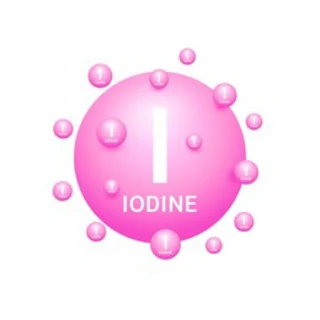Why Iodine Is Necessary for Our Body ?
Understanding the Importance Iodine for our body. It's benefits, and dangers of excessive use.
Iodine is an essential mineral that plays a critical role in human health. While it’s often overlooked compared to other minerals like calcium or iron, iodine is vital for proper body functioning. It is especially significant for the thyroid gland, which regulates various metabolic processes through hormone production. Despite its importance, many people remain unaware of the profound effects of iodine on their health, both positively and negatively. In this article, we will explore why iodine is necessary for our body, its benefits, and the potential dangers of excessive iodine consumption.
Introduction to Iodine
Iodine is a trace mineral, which means our bodies require only a small amount for optimal function. Despite its seemingly minor role, iodine is essential for the synthesis of thyroid hormones—thyroxine (T4) and triiodothyronine (T3). These hormones regulate metabolic activities, body temperature, and even heart rate, influencing almost every aspect of health. Iodine is naturally present in some foods, and it’s often added to table salt to prevent deficiency in populations that do not consume enough iodine-rich foods.
Deficiency in iodine can lead to various health problems, including goitre (an enlarged thyroid gland) and intellectual impairments. However, as with many nutrients, balance is key. While iodine deficiency poses risks, excessive intake can also cause serious health issues. Understanding the proper balance of iodine is crucial for maintaining overall well-being.
The Benefits of Iodine
1. Supports Thyroid Function
The most significant role iodine plays is in supporting the thyroid gland. The thyroid needs iodine to produce T3 and T4 hormones, which regulate metabolism. A well-functioning thyroid ensures the body can efficiently convert food into energy, maintain a healthy weight, and regulate bodily processes such as growth, repair, and temperature control.
Without adequate iodine, the thyroid cannot produce enough hormones, leading to hypothyroidism. This condition slows down the body's metabolism, resulting in weight gain, fatigue, depression, and sensitivity to cold. In severe cases, iodine deficiency can lead to the development of goitre, where the thyroid gland becomes enlarged as it struggles to produce sufficient hormones.
2.Essential for Cognitive Development
Iodine is particularly important during pregnancy and early childhood as it plays a crucial role in brain development. Pregnant women with iodine deficiency risk giving birth to children with intellectual disabilities and developmental delays. The World Health Organization (WHO) estimates that iodine deficiency is the leading cause of preventable intellectual disabilities globally. Ensuring adequate iodine intake during pregnancy and in early childhood helps promote healthy brain development and cognitive function.
3.Boosts Metabolism
Since thyroid hormones regulate metabolic processes, iodine indirectly helps in boosting metabolism. A healthy metabolism is necessary for breaking down nutrients and generating energy efficiently. People with optimal iodine levels often find it easier to manage their weight and maintain energy throughout the day. Conversely, an iodine deficiency can slow down metabolism, leading to weight gain, fatigue, and other metabolic disorders.
4. Improves Immune Function
Recent studies suggest that iodine may also have a role in enhancing immune function. Iodine appears to promote the activity of antioxidant enzymes, which protect cells from damage by free radicals. A robust immune system is essential for warding off infections and maintaining overall health, and iodine contributes to that.
5.Promotes Healthy Skin and Hair
Healthy levels of iodine also contribute to skin and hair health. Iodine helps regulate the moisture levels in the skin, preventing dryness and irritation. Additionally, because iodine aids in hormone production, it can also support healthy hair growth. Those with thyroid imbalances, often caused by insufficient iodine, may notice hair thinning or dry, flaky skin as common symptoms.
Some of the best sources of iodine
1. Seaweed
Types: Kelp, nori, wakame, kombu
Iodine content: Seaweed is one of the richest natural sources of iodine. Just a small serving can provide more than the daily recommended intake.
Usage: Seaweed can be eaten in soups, salads, sushi, or as a dried snack.
2. Fish and Seafood
Types: Cod, tuna, shrimp, scallops, and sardines
Iodine content: Seafood, particularly saltwater fish, contains a good amount of iodine due to its presence in the ocean.
Usage: These can be grilled, baked, or added to soups and salads.
3. Dairy Products
Types: Milk, yogurt, cheese
Iodine content: Dairy products are another excellent source of iodine due to iodine supplementation in cattle feed and iodine used in sanitizing equipment.
Usage: Enjoy dairy products in smoothies, cereals, or as snacks.
4. Iodised Salt
Iodine content: Iodised table salt is a common and convenient source of iodine. Just half a teaspoon can meet the daily requirement.
Usage: Sprinkle iodised salt in cooking or on prepared foods.
5. Eggs
Iodine content: Eggs, especially the yolk, contain iodine as a result of the hen’s diet.
Usage: Eggs can be boiled, scrambled, or used in a variety of dishes like omelettes and salads.
6. Fortified Bread and Grains
Some breads and cereals are fortified with iodine, especially in countries where iodine deficiency is a concern.
Usage: Check product labels for iodine-fortified varieties.
7. Meat and Poultry
Types: Beef, chicken, turkey
Iodine content: These can contain moderate amounts of iodine depending on the diet of the animal.
Usage: Grilled, roasted, or added to various recipes.
8. Fruits and Vegetables
Types: Cranberries, prunes, green beans, and potatoes (especially with the skin)
Iodine content: Some fruits and vegetables contain small amounts of iodine, especially if grown in iodine-rich soil.
Usage: Consume fresh or cooked as part of a balanced diet.
9. Iodine Supplements
For individuals who have difficulty meeting their iodine needs through diet, supplements can be a good option, though they should be taken under medical advice to avoid excessive intake.
Dangers of Excessive Iodine Intake
While iodine is essential for health, consuming too much can be just as harmful as having too little. Excessive iodine intake can disrupt thyroid function, sometimes causing conditions that are just as serious as those resulting from deficiency.
1. Hyperthyroidism
An excess of iodine can lead to hyperthyroidism, a condition where the thyroid produces too many hormones. This can result in a sped-up metabolism, causing weight loss, anxiety, irritability, rapid heartbeat, and tremors. Hyperthyroidism can be dangerous if left untreated and may lead to serious health complications, including heart problems and osteoporosis.
2. Iodine Toxicity
Although rare, iodine toxicity can occur when someone consumes too much iodine over a short period. This condition can cause symptoms such as nausea, vomiting, and diarrhoea. In severe cases, it can lead to swelling of the throat and a burning sensation in the mouth or throat, necessitating immediate medical attention.
3. Worsening of Autoimmune Thyroid Disorders
People with pre-existing thyroid disorders, such as Hashimoto's disease or Graves’ disease, must be particularly careful about their iodine intake. Excess iodine can exacerbate these conditions, leading to a worsening of symptoms. For individuals with autoimmune thyroid disorders, it's crucial to follow a healthcare professional’s advice regarding iodine consumption.
4. Goitre Due to Excess Iodine
Ironically, while iodine deficiency can cause goitre, excessive iodine intake can also lead to goitre formation. This occurs because too much iodine can overwhelm the thyroid, causing it to become enlarged as it tries to balance hormone production.
5. Increased Risk of Thyroid Cancer
High iodine intake has been linked to an increased risk of developing certain types of thyroid cancer. While this risk remains low in populations with normal iodine consumption, it is a potential danger for those who consume excessive iodine, particularly through supplements.
How Much Iodine Do You Need?
The recommended daily intake of iodine varies by age, gender, and life stage.
For adults, the general recommendation is about 150 micrograms (mcg) per day.
Pregnant and breastfeeding women require more, around 220 to 290 mcg daily, to support their health and the development of the child.
Good sources of iodine include seaweed, fish, dairy products, and iodised salt. However, it's important to avoid overconsumption, particularly with supplements, unless directed by a healthcare professional.
Conclusion
Iodine is an essential mineral that plays a crucial role in thyroid function, cognitive development, and metabolism. Ensuring adequate iodine intake is vital for overall health, particularly for pregnant women and young children. To maintain a healthy balance, it’s important to follow dietary guidelines and consult with healthcare professionals if there are concerns about iodine levels. By understanding the role of iodine in the body, we can take steps to ensure our health is optimally supported.
Thanks for reading,
Have a nice day.😊









Comments
Post a Comment